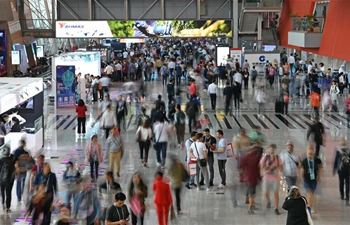CAPE TOWN, April 15 (Xinhua) -- As many as one in two people with multi-drug resistant tuberculosis (TB) are dying of the disease in South Africa because of limited access to effective medicine, Doctors without Borders (MSF) said on Monday.
Although South Africa has one of the best programs in the world against drug-resistant TB, many patients are still not effectively treated, the MSF said in a statement emailed to Xinhua.
The MSF has strongly recommended the introduction of a much-needed drug-resistant TB (DR-TB) medicine called delamanid into South Africa, but so far delamanid has not been routinely made available within the public health system for those who need it, the statement said.
The South African Health Products Regulatory Authority has registered delamanid, but the National Department of Health (NDH) has been slow to activate existing plans to introduce the medicine to the public health system, according to the MSF.
Delamanid can be a life-saving drug for many patients, said Laura Trivino-Duran, medical coordinator for MSF in South Africa.
In 2017, the NDH launched a delamanid clinical access program with the pharmaceutical manufacturer Otsuka, providing selected patients in five locations across the country with access to delamanid while processes to register the drug locally were underway.
However, strict criteria were put in place preventing many who would have benefited from delamanid from qualifying for access, the MSF said.
Official figures show that annually South Africa is missing about 160,000 patients with TB, which is the country's contribution to the more than 4 million people globally with TB that are not on treatment.
Only two new DR-TB drugs have been approved in the last 50 years, bedaquiline and delamanid in South Africa, and both are now registered for use in the country, with bedaquiline having been incorporated into the standard treatment for DR-TB in 2018.
This was a historic decision to improve patients' chances of being cured and make DR-TB treatment more tolerable.
However, bedaquiline is not yet approved for certain groups, including children under the age of six, who can suffer from side-effects of the available treatment options, according to the MSF.
"Delamanid is safe for use in young children, and with easy access to the drug TB doctors will be able to do more for our kids," said Trivino-Duran.
Delamanid is also an important treatment option for people with extensively drug-resistant forms of TB, as well as patients experiencing serious side-effects from other DR-TB drugs, according to the MSF.
A 2017 study estimated that the cost of generic delamanid, if the production of generic delamanid were allowed, could be up to 98-percent lower than the current pricing.
"The push for access to delamanid has been a long one, with government playing a leading role," Trivino-Duran said, adding that having easy access to this drug will be another big step on the even longer road toward being able to offer patients a treatment regimen for DR-TB that is drastically shorter and more effective.













